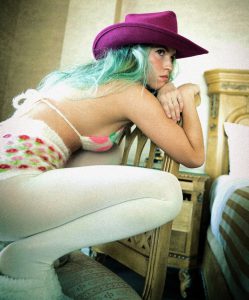 Who would refuse being admitted to Paradise Club? After all, it’s a space of freedom, empowerment, and free speech. Over the course of the last few years, we’ve gotten acquainted with Claudia Bouvette as a musician, singer, and actress. She’s even detoured into reality TV, but the version of herself that always re-surfaces, stronger than the others, is the music-making one. The young woman’s true love takes centre stage with the release of her first full-length album The Paradise Club.
Who would refuse being admitted to Paradise Club? After all, it’s a space of freedom, empowerment, and free speech. Over the course of the last few years, we’ve gotten acquainted with Claudia Bouvette as a musician, singer, and actress. She’s even detoured into reality TV, but the version of herself that always re-surfaces, stronger than the others, is the music-making one. The young woman’s true love takes centre stage with the release of her first full-length album The Paradise Club.
Beyond being an album of orary heartbreak, Claudia Bouvette’s first full-length is also a major statement. “It’s such a personal project,” she says, to open. “I want to share with the world this state of relief that came with my songs and my album.” Through each story and verse, what stands out most, for her, is that “it’s really going to be okay, no matter what shitty situation you find yourself in.” Musically, she took great care to emphasize the rhythm: “The themes and topics are on the sad side, but the music is upbeat. I’ll never be able to hide from my recurring theme: decrying the behaviour of the ‘uglies.’ Yet, I try to do it with a somewhat positive vibe,” she says, giggling.
Aware of the constant pressure on women, and the performance they’re expected to deliver, she remains a proponent of genuinely letting go, and taking a moment to choose what’s best for us. “We’re told we’re supposed to be able to do everything at once, as women and as musicians,” she says. “What ends up happening is, we get confused, and don’t know where to start. It gets depressing, because there’s a good chance you can’t manage having the weight of the whole world on your shoulders.”
Not one to hide her ambition, she knows what she’s worth, and her lyrics reflect a desire to point toward the less-than-perfect road that nonetheless leads to self-accomplishment. “You can’t go very far when you don’t know where to start,” she says. “It’s happened to me. I wasn’t doing well at all, but it’s amazing how time will fix everything, and how taking a break allows you to move faster afterwards.”
For her, songwriting begins with synth chords and a few onomatopoeiac phrases, which allow the phonetics to dominate. “What’s crazy is that words and phrases create themselves this way, thanks to words that don’t really exist,” Bouvette explains. “I build around that. I always write the lyrics las,t and I fine-tune the phrasing with Connor, since he’s Anglophone.”
He whose name is on everyone’s lips lately, Connor Seidel, co-wrote and co-produced The Paradise Club with Bouvette. Chosen by many artists to assist in the production of their work, Seidel knows how to deploy his talent where it’s needed, allowing the full grandeur of the artist’s skill to unfold before him. Bouvette is thus captain of her Club, in full control of her words and sound. “I’ve known Connor for many years,” she says. “We did my first EP together. He gave me the space I needed to express myself, and believe in myself. I’m very instinctive, but that implies a certain level of insecurity. His humility opens creative doors for me.”
Once the songs were written, the work was long and meticulous, both in the studio and at home. ‘I did a lot of work alone in my bedroom,” says Bouvette. “Then we created universes together. There’s something very organic in our approach. I can be very picky, but very easygoing, too. I like being surprised by sounds I’d never think of pursuing. The end result is totally uninhibited.”
While happily mixing French and English, she still feels stronger in the latter, although what drives her even more is the range of possibilities when you can play with both. “The sounds roll around in my mouth easier in English, but I think it’s really enriching to be able to have both co-exist,” she says.
Bouvette is increasingly able to recognize the tools that push her creativity further: listening to music, analyzing texts, reading books, or poetry. “I also put my phone down!” she exclaims. “The second I spend too much time on my phone, I lose all my creativity. In the end, though, it’s really my suffering that motivates me. Even when I feel fine, I’m inclined to go reach for darker feelings that I experience in everyday life. Maybe I write songs to liberate myself from something.”